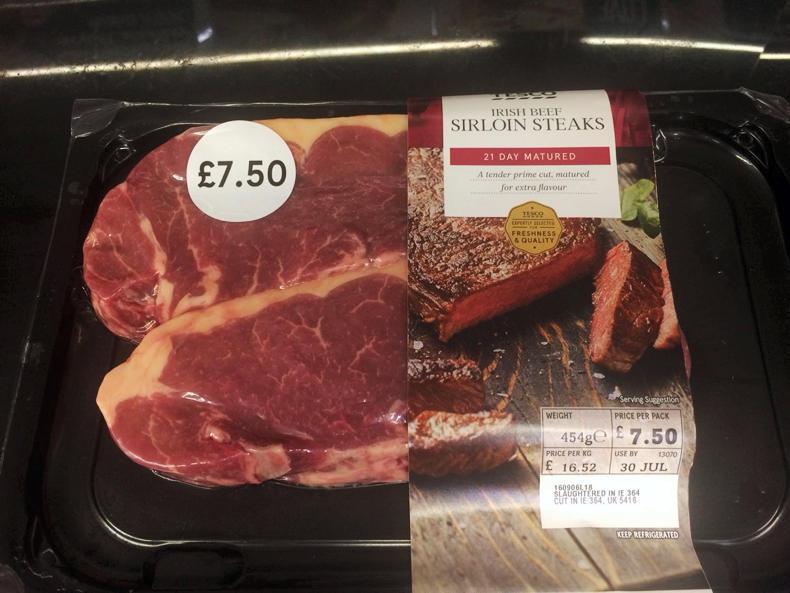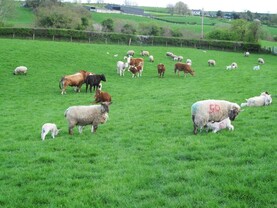The closure of Irish and UK burger chains this week was a blow to beef producers and this was followed by the closure of the marts both sides of the border.
This means that for beef and sheep producers the routes to market are now limited to factories for live cattle and sheep, then just retail for selling beef to consumers.
Huge supermarket demand
Demand in supermarkets and butchers is strong for beef as people are confined to their homes and, so far, as empty shelves have been continually refilled, the food chain has operated extremely well in difficult circumstances.
Creameries and meat factories have put in place arrangements to virtually eliminate human contact in the movement of livestock and milk off farm into the processing stage.
It is at this point that it gets more complicated, because while the dairy sector is increasingly automated, meat processing still has a huge labour requirement.
Achieving the required social distancing has proved challenging and this has led to walk-outs by members from the Unite trade union in three factories in Northern Ireland - two beef and one major poultry processor.
Social isolation or production?
This illustrates the dilemma of trying to reconcile the need to maintain food production and distribution at a time when medical advice is to operate social isolation in our homes and only leave them to carry out the basic needs for survival.
Work that is necessary is accepted, but difficult to define. For example, it is clear that builders working on a holiday home aren’t providing a necessary service, but builders working to adapt a hospital to deal with the increasing numbers of patients are.
Is meat processing necessary?
What about meat processing? On one hand, it is possible to survive without meat and a case could be made for shutting down.
However, the cycle of beef and sheepmeat production cannot be switched off at a stroke and if there are no factories available to process livestock when ready, very quickly a huge animal welfare issue builds.
Additionally, society is in an extremely nervous state in relation to food supplies as the queues around supermarket car parks demonstrated.
Shopping patterns shows that people are buying the staples and engaging in home cooking to an extent that hasn’t happened in decades
Now that access to these is limited, what does it do to the mindset of consumers if they hear that they cannot get their chicken nuggets or mince to make a family meal?
Yes, there may be alternatives, but shopping patterns shows that people are buying the staples and engaging in home cooking to an extent that hasn’t happened in decades.
Medical staff in front line - factory workers next
The bottom line is that there is no easy answer. Doctors and nurses have been working up close to people infected with the virus, regularly without the proper protective equipment.
Several medical personnel have lost their lives trying to assist others. Keeping meat processing going is a lower priority than front-line medical service.
However, maintaining food production and distribution is vital and factory workers, food distributors and supermarket staff are essential in maintaining food supplies to the population.
It is important that this service continues and that employers do whatever is possible to create a safe working environment, which will no doubt come at a financial cost to them.
Read more
Workers at Linden Foods walk out over social distancing concerns
Leave the fish in the sea and the cattle in the fields
The closure of Irish and UK burger chains this week was a blow to beef producers and this was followed by the closure of the marts both sides of the border.
This means that for beef and sheep producers the routes to market are now limited to factories for live cattle and sheep, then just retail for selling beef to consumers.
Huge supermarket demand
Demand in supermarkets and butchers is strong for beef as people are confined to their homes and, so far, as empty shelves have been continually refilled, the food chain has operated extremely well in difficult circumstances.
Creameries and meat factories have put in place arrangements to virtually eliminate human contact in the movement of livestock and milk off farm into the processing stage.
It is at this point that it gets more complicated, because while the dairy sector is increasingly automated, meat processing still has a huge labour requirement.
Achieving the required social distancing has proved challenging and this has led to walk-outs by members from the Unite trade union in three factories in Northern Ireland - two beef and one major poultry processor.
Social isolation or production?
This illustrates the dilemma of trying to reconcile the need to maintain food production and distribution at a time when medical advice is to operate social isolation in our homes and only leave them to carry out the basic needs for survival.
Work that is necessary is accepted, but difficult to define. For example, it is clear that builders working on a holiday home aren’t providing a necessary service, but builders working to adapt a hospital to deal with the increasing numbers of patients are.
Is meat processing necessary?
What about meat processing? On one hand, it is possible to survive without meat and a case could be made for shutting down.
However, the cycle of beef and sheepmeat production cannot be switched off at a stroke and if there are no factories available to process livestock when ready, very quickly a huge animal welfare issue builds.
Additionally, society is in an extremely nervous state in relation to food supplies as the queues around supermarket car parks demonstrated.
Shopping patterns shows that people are buying the staples and engaging in home cooking to an extent that hasn’t happened in decades
Now that access to these is limited, what does it do to the mindset of consumers if they hear that they cannot get their chicken nuggets or mince to make a family meal?
Yes, there may be alternatives, but shopping patterns shows that people are buying the staples and engaging in home cooking to an extent that hasn’t happened in decades.
Medical staff in front line - factory workers next
The bottom line is that there is no easy answer. Doctors and nurses have been working up close to people infected with the virus, regularly without the proper protective equipment.
Several medical personnel have lost their lives trying to assist others. Keeping meat processing going is a lower priority than front-line medical service.
However, maintaining food production and distribution is vital and factory workers, food distributors and supermarket staff are essential in maintaining food supplies to the population.
It is important that this service continues and that employers do whatever is possible to create a safe working environment, which will no doubt come at a financial cost to them.
Read more
Workers at Linden Foods walk out over social distancing concerns
Leave the fish in the sea and the cattle in the fields






 This is a subscriber-only article
This is a subscriber-only article








SHARING OPTIONS: